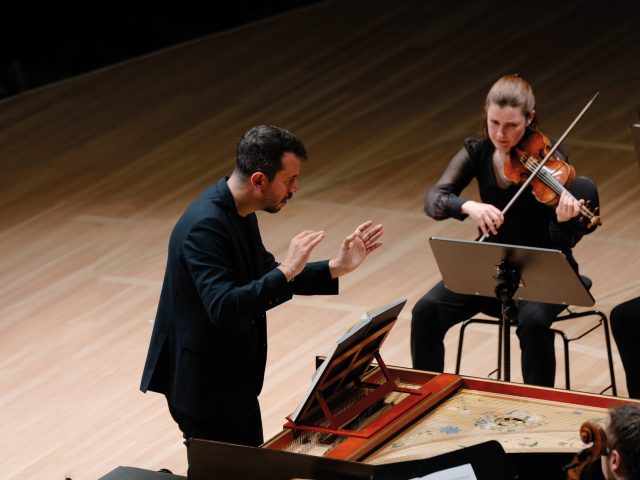IN THE LOGE with Francesco Corti
by Eline Hadermann, Thu, Nov 14, 2024

The Italian conductor Francesco Corti has been working with our musicians for some time to develop their stylistic flexibility and now returns for Joseph Haydn's Harmoniemesse. Why is this the perfect piece for that? And how is it that a young harpsichordist like him harbors such a passion for early and classical music?
Francesco Corti's Instagram name makes music lovers chuckle: "Harpiscorti" is a clever blend of the maestro’s name and his instrument (the harpsichord) and neatly sums up his fiery passion for pre-Romantic music: 'The harpsichord can definitely be called a peculiar instrument. It is 'limiting' in terms of sound, range, and ensemble possibilities, but that very aspect forces you to be creative with it.' The same goes for the music that is generally meant for the harpsichord, Corti believes: 'Early music leaves many questions open. The further back in time you go, the fewer indications you find in the scores. You rely on the – albeit rich – literature to decide how often, freely, or quickly you can play something, and on your imagination. What were the composer’s intentions? What do I feel when I play these notes? Do I have the same priorities? Those are fascinating questions.'
‘For the Harmoniemesse, the choir and orchestra will have to step out of their comfort zones and find new ways to join forces.’
— Francesco Corti
As a conductor as well as a harpsichordist, Corti is inspired by such a creative process. In 2021, when he conducted Mozart / Concert Arias, he made an impression on the Symphonic Orchestra of OBV. With his infectious enthusiasm and attention to the score, he forged an artistic connection with the musicians. 'The orchestra members are versatile by nature. They perform in two theaters, immerse themselves in a wide range of musical styles every season, and are used to accompanying people they hardly see or hear. Although they have developed their own solid group sound, they always show a sincere interest in adapting it to the needs of the composer they are interpreting. During that first project, we immediately felt a mutual curiosity: how could we work together on their stylistic flexibility? When I conducted them last season during an aperitif concert with 18th-century music, I felt they enjoyed experimenting together. I was looking forward to the next step.'
That next step is set to appear on OBV's November program. During the Harmoniemesse concert, Corti and the opera house's orchestra and choir will bring two symphonic gems by Joseph Haydn to life. 'Open Haydn’s catalog, close your eyes, pick a random piece, and you’ll have a jewel in your hands. But his Harmoniemesse (1802), one of his last major works, is the perfect piece to work on style. The title refers to an unusually large wind section, which is in constant dialogue with every other instrumental group. This gives the mass a special tone color, while also creating an interesting interplay – not only between winds and strings, but also between orchestra, choir, and soloists. As is typical in the classical repertoire, Haydn focuses in his writing on articulation that seems to mimic human diction. The instruments often imitate what the soloists and choir sing – a dynamic that may be somewhat less present in the dramatic context of an opera. I think the choir and orchestra will have to step out of their comfort zones and find new ways to join forces. For me, it is also a great pleasure to conduct a piece that has been on my wish list for so long. With Haydn's Symphony No. 84 'In nomine Domini' also on the program, it will be a brilliant concert in which everyone can fully showcase their talents.'
Picture by © Daniel Dittus
Antwerp | Gent
Harmoniemesse
Joseph Haydn
